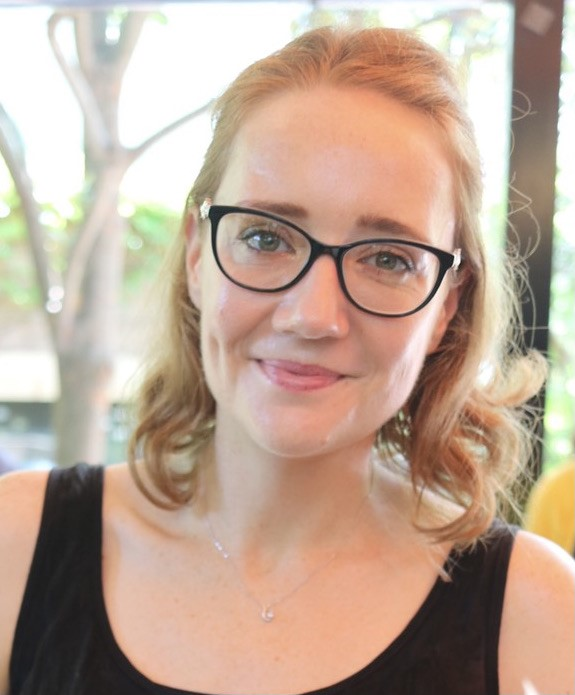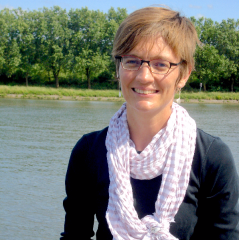ASU professors use Institute for Humanities Research funding to support research at ASU, abroad

As the spring semester draws to a close, several School of International Letters and Cultures faculty members are wrapping up research projects they undertook with the support of funding from the Institute for Humanities Research at Arizona State University.
Judit Kroo, assistant professor of modern Japanese linguistics and comparative cultural studies, was awarded a seed grant a year ago for her project “Sustainable Artisanship: Mapping Alternative Lifeways in Contemporary Japan.”
Four other professors received IHR fellowships for the 2021–22 academic year:
• Serena Ferrando, assistant professor of environmental humanities and Italian, for “City of Water: How Poetry Shaped Milan.”
• Daniel Gilfillan, associate professor of German, for “’The Unsung Planet’: Resilience, Resonance and Our Sonic Imagination.”
• Natalie Lozinski-Veach, assistant professor of German and comparative cultural studies, for “Creaturely Constellations: Animals, Language and Critical Thought After Auschwitz.”
• Francoise Mirguet, associate professor of ancient Hebrew and the history of emotions, for “Rediscovering Consolation: Can Three Antique Cultures Help Us Reimagine Grief and Its Relief?”
Kroo’s project “maps forms of self, community and political building among Japanese shokunin (artisans) in zones of ecological devastation,” she said. Her approach is transdisciplinary – using ethnography, linguistic anthropology and digital humanities. She hopes to explore what these communities’ linguistic practices demonstrate about endurance, resilience and risk management under socioeconomically and ecologically precarious conditions.
Judit Kroo
Kroo has used the seed grant funding to build a prototype website for her project, communicate and conduct Zoom interviews with artisans across Japan, transcribe her interviews, and form a research partnership with Akita International University in Akita, Japan.
She was invited to present her research at the annual meeting of Anthropology of Japan in Japan and the annual conference of the Association for Asian Studies. She has also been applying to additional funding sources in order to continue work on the project beyond this school year.
“This award has been crucial to allowing me to connect with not only artisan communities, but also with other scholars of artisanship in Japan,” Kroo said. “Besides funding data collection, the grant has enabled me to demonstrate proof of concept for the project, which is crucial for successful applications for further grants. I am exceedingly grateful to the IHR for their support of my research!”
Kroo isn’t the only School of International Letters and Cultures faculty member currently being supported by an IHR seed grant.
Assistant Professor of Portuguese Ligia Bezerra was awarded seed funding at the end of the fall semester in support of her project "Defending Democracy: Twenty-First Century Brazilian Songs of Protest." That funding will carry her through the end of 2022, but like many recipients, she expects to continue work on her project for several years.
Meanwhile, the IHR fellowship recipients each received research funds, a course buyout and registration for the National Center for Faculty Development and Diversity’s fall 2021 Faculty Success Program. Both Mirguet and Lozinski-Veach hope to use their funding for travel abroad – to Toulouse, France, and Marbach am Neckar, Germany, respectively.
Natalie Lozinski-Veach
Lozinski-Veach is working on a book manuscript that “analyzes the aesthetic functions of animals in German and Polish literature and thought after 1945,” she said.
She has conducted research for, written and revised various chapters of the book over the past year, including submitting for publication an article on animals and trauma theory, and another article on the connections between aesthetics after the Shoah (also known as the Holocaust) and in the Anthropocene. The latter article will be part of a special issue of The Germanic Review on the poet Paul Celan; Lozinski-Veach is co-editing that forthcoming issue.
She said her current research “traces how nonhuman animals disrupt and expand conventional notions of language and so open up alternative approaches to challenges of Shoah representation and the unspeakability of trauma.”
In addition to the IHR fellowship, Lozinski-Veach has applied for a fellowship to conduct archival research for her book at the Deutsches Literaturarchiv Marbach, or German Literature Archive Marbach.
Mirguet is also currently researching and writing a book. Hers “explores the construction of grief and its relief in three ancient cultures — ancient Israel, Imperial Rome and Hellenistic Judaism — in comparison with contemporary Western societies,” she said.
Francoise Mirguet
She has submitted an article for publication about the political value of the lamentations voiced by the first-century C.E. Jewish historian Flavius Josephus in his history of the Judean War. She will present that research this summer at the biennial conference of the North American Chapter on the History of Emotion. She also submitted an abstract to present on gestures of consolation and comfort in the Hebrew Bible at the annual conference of the European Association of Biblical Studies.
Mirguet sees a timeliness to her research as grief remains at the forefront of many people’s minds due to the pandemic and other national and global events.
“There is an intense need for comfort and consolation as we emerge from the pandemic,” she said. “I love exploring how other cultures perceived the experience of grief and imagined ways to provide soothing and comfort to those in distress. I believe that practices of consolation, across cultures and history, may inform how we deal with our own pain and how we comfort those around us.”
More Arts, humanities and education
ASU FIDM students to see their designs on the runway at Uncertainty Fashion Showcase
Nola Hill is perfecting every stitch of her fashion design collection, which she started conceptualizing last summer.She is among…

ASU+GSV Summit brings experts together to discuss innovation in education
This week, Arizona State University President Michael Crow and other university leadership joined education and learning experts…

ASU professor's project helps students learn complex topics
One of Arizona State University’s top professors is using her signature research project to improve how college students learn…




